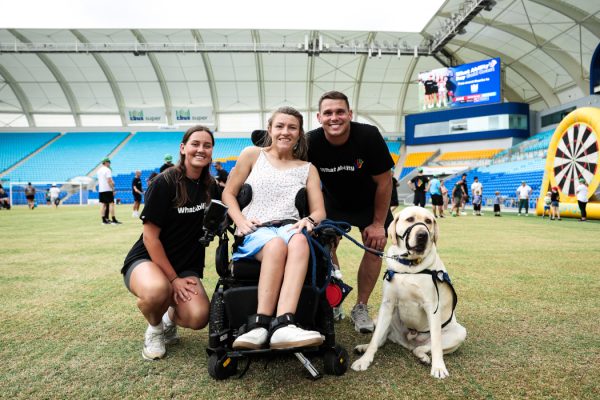
NDIS tips: transition planning as your child ages
As your child ages, their changing goals and needs will need to be reflected in their NDIS plan. This is especially true at times of transition such as moving into further education, leaving school, starting work etc. The NDIS experts at LeapIn have some invaluable advice about things to consider when your child experiences these milestone moments…
Moving through the teen years into adulthood can be a challenging time for young people, as well as parents or carers. It can be hard to know when to offer support and when to step back. You’re not alone if you’re concerned or anxious about:
• Talking to children and teenagers about their bodies, boundaries and sexuality
• Risky activities and behaviour
• Extreme emotions or emotional swings • Self-esteem and social interactions
• Social media, bullying and societal pressures
• Future education or work
The transition to adulthood can be particularly difficult for people with a disability and their families as they navigate a changing landscape of emotions, relationships, decisions and desire for independence.
Early transition planning and clear communication are valuable strategies for managing this rite of passage and supporting your teen to become more responsible and independent.
The 6 steps in transition planning
A transition plan can be a simple document that sets out the steps that support a transition.
Step 1: Write down your child’s strengths, skills, interest and abilities.
Step 2: Work together to develop some short and long-term goals.
Step 3: Write down the skills/qualifications, practical requirements and/or support needs associated with achieving those goals.
Step 4: Identify which skills your child needs to develop or practice to reach their goals.
Step 5: Talk with people who might be able to provide advice or support such as teachers, support workers, allied health professionals, doctors, government agencies, family and friends.
Step 6: Review the plan regularly and adjust as goals and aspirations change.
TYPES OF TRANSITIONS
School to further education
With many courses now available online, there are more options for further education than ever before. However, there are often additional barriers for people with a disability to overcome, which is why prior planning is important. Barriers may include the availability of suitable courses, accessible course structures and financial constraints.
The good news is that more people with a disability than ever are attending university. Most universities and TAFE colleges have Equity and Diversity offices that promote inclusion and accessibility as well as provide student support. Government funding is available to educational institutions for disability- related supports such as sign language interpreters, notetakers and screen reading software.
Tips for further education planning
• What steps can be taken to improve the chances of securing a place? For example, grades, prior study, recognition of prior learning, industry experience.
• Research courses available and how they are delivered.
• Check out campus facilities and access – it helps to visit in person.
• Is online study a more flexible, accessible option?
• Get in touch with the Equity and Diversity Office and see what supports will be available.
• Explore financial assistance options including equity scholarships, bursaries and HECS-HELP or FEE-HELP loans.
How can the NDIS support further education?
While the NDIS generally doesn’t cover course fees, it can fund reasonable and necessary supports that help participants achieve their education-related goals. For example, the NDIS might:
• Fund a support person to help with transitions or personal care.
• Specialised training of teachers and other staff about the specific personal support needs as a student with a disability.
• Specialist transport required.
• Transportable equipment such as a wheelchair or communication devices.
The NDIS generally doesn’t cover:
• Compulsory textbooks. However, if there is an increased cost in accessing compulsory course materials due to your disability (for example, an audio book), the NDIS may fund the additional cost.
• Tuition fees or student membership fees.
• Phone calls, photocopying, stationery and meals.
Transitioning from school or further education to work
Working can help build confidence, skills, independence and social networks. But finding a job if you have a disability can be tough and requires dedication and patience.
As a parent or carer, it can be challenging to watch a person you love go through setbacks but it’s important to encourage them to talk to someone they trust and ensure emotional support is in place throughout their journey to employment.
Adequate research and transition planning during high school years can help you both be more prepared for the next step into employment.
Leap in! has developed a range of handy resources to help on our website, leapin.com.au .
Additionally, it’s worth knowing that the NDIS can fund job-related support like:
• Building skills and capacity to find and maintain a job.
• Personal care or assistance with. transport where you need it to work
• Assistive technology devices such as wheelchairs, personal communication devices or a hearing aid.
• Supported employment, such as services offered by a range of Australian Disability Enterprises.
Independent living
Transitioning your child or adult with a disability to independent living can be an emotional time. For parents, families and carers, there can often be mixed feelings about the shift to greater independence. It is natural to feel concern for the person’s welfare and whether they will be able to manage a new situation.
Capacity building and independence are closely linked. The Capacity Building budget category is all about developing and improving the skills needed for living more independently. This may include support to:
• Find and maintain an appropriate place to live.
• Improve skills to participate in social and recreational activities.
• Access training or therapy to increase skills such as learning how to cook or improving communication skills.
• Find employment-related support, training and assessments to find and keep a job.
• Improve relationships through positive behaviours and interactions with others. • Obtain training, advice and help for transitioning from school to
further education.
Social or community participation
Being involved in the community can be fulfilling, build confidence, develop skills and contribute to an overall sense of wellbeing.
The NDIS can assist in two ways:
1. Increased Social and Community Participation – Capacity Building budget category covers development and training to increase skills to participate in community, social and recreational activities.
2. Assistance with Social and Community Participation – Core supports budget category may fund a support worker to assist an NDIS participant to take part in social and community activities.
Leap In! can help you understand your NDIS Plan, effectively utilise your allocated funding and connect you with relevant providers. You can call us on 1 300 057878 to speak to a plan manager for advice or email us at [email protected].







